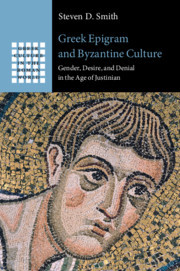Description
Greek Epigram and Byzantine Culture
Gender, Desire, and Denial in the Age of Justinian
Greek Culture in the Roman World Series
Author: Smith Steven D.
An exciting analysis of gender and sexual desire in sixth century Greek epigram that bridges classical and early Byzantine culture.
Language: English
Subject for Greek Epigram and Byzantine Culture:
Approximative price 32.87 €
In Print (Delivery period: 14 days).
Add to cart
Greek Epigram and Byzantine Culture
Publication date: 08-2021
Support: Print on demand
Publication date: 08-2021
Support: Print on demand
Approximative price 107.80 €
In Print (Delivery period: 14 days).
Add to cart
Greek Epigram and Byzantine Culture
Publication date: 05-2019
288 p. · 15.8x23.5 cm · Hardback
Publication date: 05-2019
288 p. · 15.8x23.5 cm · Hardback
Description
/li>Contents
/li>Biography
/li>
Sexy, scintillating, and sometimes scandalous, Greek epigrams from the age of the Emperor Justinian commemorate the survival of the sensual in a world transformed by Christianity. Around 567 CE, the poet and historian Agathias of Myrina published his Cycle, an anthology of epigrams by contemporary poets who wrote about what mattered to elite men in sixth-century Constantinople: harlots and dancing girls, chariot races in the hippodrome, and the luxuries of the Roman bath. But amid this banquet of worldly delights, ascetic Christianity - pervasive in early Byzantine thought - made sensual pleasure both more complicated and more compelling. In this book, Steven D. Smith explores how this miniature classical genre gave expression to lurid fantasies of domination and submission, constraint and release, and the relationship between masculine and feminine. The volume will appeal to literary scholars and historians interested in Greek poetry, Late Antiquity, Byzantine studies, Early Christianity, gender, and sexuality.
Introduction; 1. Food and wine; 2. An erotic geography; 3. Urban pleasures; 4. Phallic creatures; 5. Classical women; 6. Thieving Aphrodite; Conclusion; Bibliography.
Steven D. Smith is Professor of Classics and Comparative Literature at Hofstra University, New York. His publications include Greek Identity and the Athenian Past in Chariton: The Romance of Empire (2007) and Man and Animal in Severan Rome: The Literary Imagination of Claudius Aelianus (Cambridge, 2014).
© 2024 LAVOISIER S.A.S.
These books may interest you

The Hippodrome of Constantinople 22.46 €



